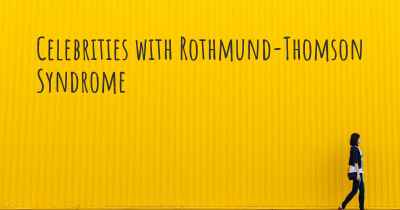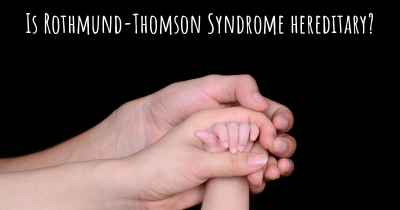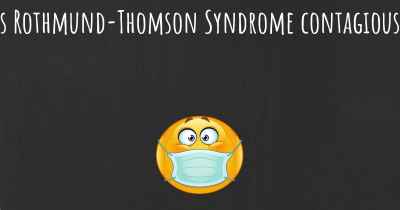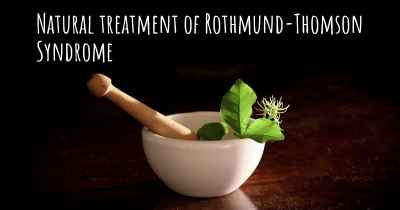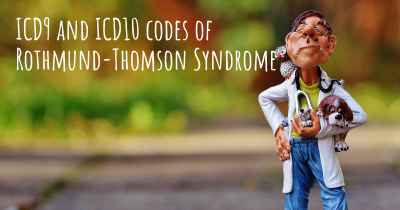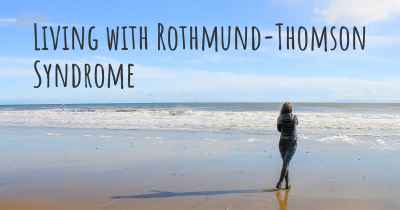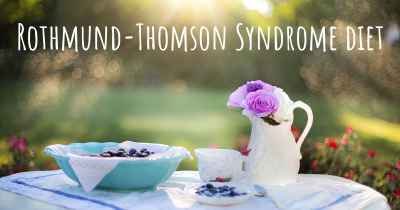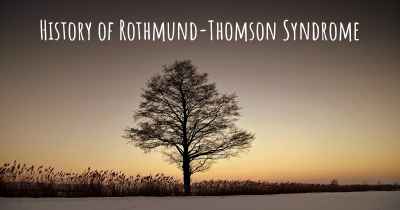What is the life expectancy of someone with Rothmund-Thomson Syndrome?
Life expectancy of people with Rothmund-Thomson Syndrome and recent progresses and researches in Rothmund-Thomson Syndrome

Rothmund-Thomson Syndrome (RTS) is a rare genetic disorder characterized by various physical abnormalities and an increased risk of developing certain cancers. The life expectancy of individuals with RTS can vary widely depending on the severity of symptoms and associated complications. While there is no specific data on life expectancy for RTS, it is generally believed that individuals with milder forms of the syndrome can have a normal lifespan. However, those with more severe manifestations and complications may experience a reduced life expectancy. Regular medical monitoring, early detection of potential health issues, and appropriate management can help improve the quality of life and potentially extend the lifespan of individuals with RTS.
Rothmund-Thomson Syndrome (RTS) is a rare genetic disorder that affects various systems in the body. It is characterized by distinctive facial features, skeletal abnormalities, short stature, and a predisposition to develop certain types of cancer. One of the key concerns for individuals with RTS and their families is understanding the potential impact on life expectancy.
Life expectancy in RTS:
It is important to note that predicting life expectancy in individuals with Rothmund-Thomson Syndrome can be challenging due to the wide variability in symptoms and severity among affected individuals. The condition can range from mild to severe, and the prognosis can differ significantly from person to person.
While there is no definitive answer to the life expectancy of someone with RTS, several factors can influence their overall health and well-being:
- Cancer risk: Individuals with RTS have an increased susceptibility to certain types of cancer, particularly osteosarcoma (bone cancer) and skin cancer. The risk of developing cancer varies, and early detection and treatment are crucial in managing the condition. Regular medical check-ups and screenings are essential to monitor any potential cancer development.
- Severity of symptoms: The severity of RTS symptoms can vary widely. Some individuals may experience milder manifestations, while others may have more significant skeletal abnormalities, growth delays, and organ involvement. The impact of these symptoms on overall health can influence life expectancy.
- Management of complications: Proper management of complications associated with RTS can significantly impact life expectancy. For example, individuals with skeletal abnormalities may require orthopedic interventions to improve mobility and prevent further complications. Regular monitoring and treatment of skin abnormalities and potential cancerous lesions are also crucial.
- Quality of life: While life expectancy is an important consideration, it is equally important to focus on improving the quality of life for individuals with RTS. Providing appropriate medical care, emotional support, and access to necessary resources can enhance their overall well-being and potentially extend their lifespan.
Support and management:
Individuals with Rothmund-Thomson Syndrome require comprehensive medical care and support from a multidisciplinary team of healthcare professionals. This team may include geneticists, dermatologists, orthopedic specialists, oncologists, and other specialists depending on the specific needs of the individual.
Regular follow-up appointments, screenings, and interventions are essential to manage the condition effectively. Genetic counseling can also be beneficial for families to understand the inheritance pattern and potential risks for future generations.
Conclusion:
Rothmund-Thomson Syndrome is a complex genetic disorder with varying symptoms and severity. Predicting life expectancy is challenging due to the individualized nature of the condition. Factors such as cancer risk, symptom severity, management of complications, and overall quality of life play significant roles in determining the potential lifespan of someone with RTS. Early detection, appropriate medical care, and emotional support are crucial in managing the condition and improving the overall well-being of individuals with RTS.
